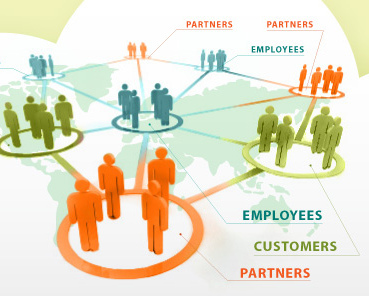There needs to be a common goal, a strategic vision and a road map that details a series of small steps towards that goal. In order to even take a small, entities which make up an organization need to work together and synchronize. Employee’s cooperation and collaboration are for an organization’s success.
The concept of collaboration has now evolved to the next rung – social collaboration. Just as in its earlier definition, every employee, every team, every department, of an organisation works towards one common goal, but with a catch. The beauty of social collaboration is that this goal need not be pre-defined.
By combining and putting our heads together towards one common purpose, idea generation, can be optimized, brainstorming sessions can be better streamlined. This is not rehashing the concept of team work, this is certainly not old wine in a new bottle. Sure this essentially teamwork, but with a key difference. It harnesses key technological innovations, and puts them to their optimal use and doing so has made all the difference.
Social communication need not be a waste of organizational resources. Technological innovations are the harbingers of collaboration that bridge continents and time zones. They provide a platform for the incubation of ideas generated after a brainstorming sessions by individuals across multiple continents. Social collaboration can be the key for that incubated idea which breaks new grounds and is recognized for its genius.
Social collaboration not only exploits the advantages of brain storming sessions but it also acts as a platform for greater innovation: the ideas discussed by in a social network across different countries lead to better ideas which significantly contribute to better innovations which lead to better products and customer satisfaction, which in turns leads to a larger number of customers, customer loyalty, etc.
The net result ultimately is higher turnovers, better revenues and profits for the organization. This in turn can be ploughed back into more and better research and development which can not only significantly impact the growth of the company but for the good of society as well. And it all started with social collaboration.
Social collaboration is a modern platform which when nurtured can enable growth. It has the potential to be the Holy Grail for an enterprise. What is required is strategic vision, and non-interference from the management. Although is easier said than done, but it is more and more visible in startups than in older, more established companies.
Modern startups have:
1. The advantage of not having hierarchical structures which block vertical communication.
2. Information flows freely across horizontal and vertical and is not segmented and isolated.
3. People who actively and positively contribute to the discussion come into focus as opposed to people who are in a particular position in the organization.
4. The advantage of being tech savvy and they exploit and harness advances in IT to their advantage.
5. A focus on internal communication and do not solely depend on their marketing department which tends to focus more on clients for idea generation instead of internalizing the process.
6. A strategic vision which enables their HR department to focus on long term objectives instead of short term ones. For example, although paying salaries immediately is important, but what is more critical is to ensure that people can be continued to be paid their salaries, three years down the line.
SAP’s President of Cloud and On-Premise HR says:
The concept of collaboration has now evolved to the next rung – social collaboration. Just as in its earlier definition, every employee, every team, every department, of an organisation works towards one common goal, but with a catch. The beauty of social collaboration is that this goal need not be pre-defined.
By combining and putting our heads together towards one common purpose, idea generation, can be optimized, brainstorming sessions can be better streamlined. This is not rehashing the concept of team work, this is certainly not old wine in a new bottle. Sure this essentially teamwork, but with a key difference. It harnesses key technological innovations, and puts them to their optimal use and doing so has made all the difference.
Social communication need not be a waste of organizational resources. Technological innovations are the harbingers of collaboration that bridge continents and time zones. They provide a platform for the incubation of ideas generated after a brainstorming sessions by individuals across multiple continents. Social collaboration can be the key for that incubated idea which breaks new grounds and is recognized for its genius.
Social collaboration not only exploits the advantages of brain storming sessions but it also acts as a platform for greater innovation: the ideas discussed by in a social network across different countries lead to better ideas which significantly contribute to better innovations which lead to better products and customer satisfaction, which in turns leads to a larger number of customers, customer loyalty, etc.
The net result ultimately is higher turnovers, better revenues and profits for the organization. This in turn can be ploughed back into more and better research and development which can not only significantly impact the growth of the company but for the good of society as well. And it all started with social collaboration.
Social collaboration is a modern platform which when nurtured can enable growth. It has the potential to be the Holy Grail for an enterprise. What is required is strategic vision, and non-interference from the management. Although is easier said than done, but it is more and more visible in startups than in older, more established companies.
Modern startups have:
1. The advantage of not having hierarchical structures which block vertical communication.
2. Information flows freely across horizontal and vertical and is not segmented and isolated.
3. People who actively and positively contribute to the discussion come into focus as opposed to people who are in a particular position in the organization.
4. The advantage of being tech savvy and they exploit and harness advances in IT to their advantage.
5. A focus on internal communication and do not solely depend on their marketing department which tends to focus more on clients for idea generation instead of internalizing the process.
6. A strategic vision which enables their HR department to focus on long term objectives instead of short term ones. For example, although paying salaries immediately is important, but what is more critical is to ensure that people can be continued to be paid their salaries, three years down the line.
SAP’s President of Cloud and On-Premise HR says:
“While this generation wants many of the same things we all want from work – good pay, good benefits, opportunities to grow in our careers and contribute to the company’s success – one way in which they do differ from earlier generations is in their expectations for technology. … These are the digital natives. They’ve grown up with technology all around them. And they expect to use the same type of social networking tools they use in their personal networks.”
As per Ettling, the benefits of social collaboration easily outweighs its negative overtones. Leveraging business networks is the glue that bind content, people and data, it simplifies work and drives towards sharing of knowledge to a common pool of experience which is a key proponent of growth and innovation.
References:
http://www.forbes.com/sites/sap/2015/03/13/is-social-collaboration-the-holy-grail-for-business-growth/
http://www.successfactors.com/en_us.html
http://www.sap.com/pc/tech/cloud/software/business-networks/index.html
References:
http://www.forbes.com/sites/sap/2015/03/13/is-social-collaboration-the-holy-grail-for-business-growth/
http://www.successfactors.com/en_us.html
http://www.sap.com/pc/tech/cloud/software/business-networks/index.html



















